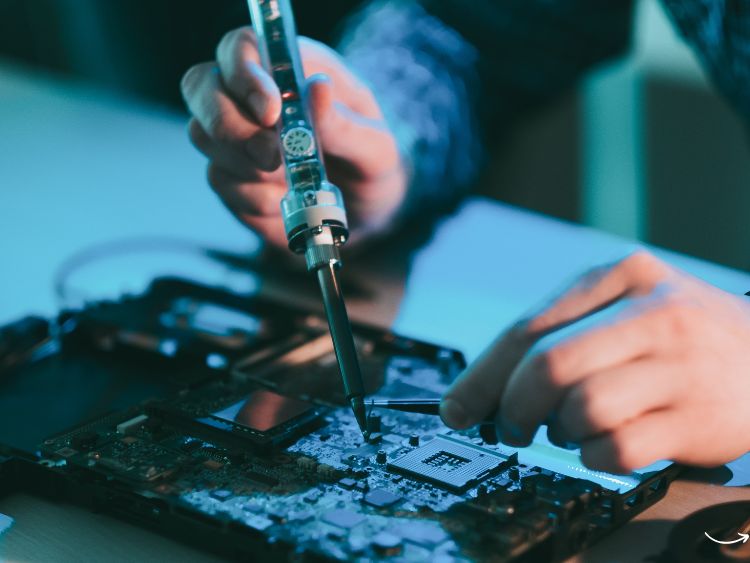Are you fascinated by the inner workings of computers and the intricate dance of circuits and components? Do you enjoy solving technical puzzles and bringing machines to life? If so, a career in computer hardware might be just the ticket for you. In this article, we’ll dive into the world of computer hardware jobs, exploring the various roles, skills required, and the career prospects that await you. Whether you’re just starting or looking to switch careers, understanding the landscape of computer hardware jobs can set you on a path to a fulfilling and dynamic profession.
What Are Computer Hardware Jobs?
Computer hardware jobs encompass a broad range of roles focused on the physical components of computers and related devices. Unlike software jobs, which deal with programming and applications, hardware jobs are all about the tangible parts – think processors, motherboards, hard drives, and peripherals. These roles require a deep understanding of electronic systems and how these components interact to create functional computers.
Types of Computer Hardware Jobs
There are several distinct roles within the realm of computer hardware. Here are a few key positions:
- Hardware Engineer: Designing and developing new computer components.
- Technician: Installing, maintaining, and repairing hardware.
- Network Engineer: Ensuring the physical components of networks are functioning.
- Systems Architect: Planning and designing complex computer systems.
- Quality Assurance Tester: Testing hardware components to ensure they meet standards.
Skills Required for Computer Hardware Jobs
To thrive in computer hardware jobs, you’ll need a blend of technical know-how and practical skills. Here’s a rundown of what employers typically look for:
Technical Skills
- Knowledge of Electronics: Understanding how electronic circuits work.
- Proficiency in CAD Software: Using computer-aided design software to create schematics.
- Troubleshooting: Diagnosing and fixing hardware issues.
- Networking: Setting up and maintaining network hardware.
- Assembly and Disassembly: Knowing how to put together and take apart hardware components.
Soft Skills
- Problem-Solving: Thinking critically to solve complex issues.
- Attention to Detail: Precision in handling delicate components.
- Communication: Explaining technical issues to non-technical stakeholders.
- Teamwork: Collaborating effectively with other tech professionals.
- Adaptability: Staying updated with the latest technology trends.
Career Path and Education
Educational Requirements
Most computer hardware jobs require at least a bachelor’s degree in computer engineering, electrical engineering, or a related field. Some positions might accept an associate degree or technical certifications, especially for technician roles.
Certifications
Certifications can enhance your qualifications and job prospects. Popular certifications include:
- CompTIA A+: A foundational certification for hardware and software.
- Cisco Certified Network Associate (CCNA): Focuses on network hardware.
- Microsoft Certified Solutions Expert (MCSE): For those working with Microsoft hardware solutions.
Career Progression
Starting as a technician or junior engineer, you can progress to senior engineering roles, project management, or specialized fields like network architecture or systems design. With experience, some professionals move into consulting or start their own businesses.
Industry Demand and Salary Prospects
Growing Demand
The demand for computer hardware professionals is on the rise, driven by advancements in technology and the increasing complexity of computer systems. Industries such as technology, healthcare, finance, and manufacturing all require skilled hardware professionals to maintain and innovate their systems.
Salary Expectations
Salaries in the computer hardware field can vary widely based on the role, experience, and location. Here’s a rough breakdown:
- Hardware Technician: $40,000 – $60,000 per year.
- Hardware Engineer: $70,000 – $120,000 per year.
- Network Engineer: $60,000 – $100,000 per year.
- Systems Architect: $90,000 – $140,000 per year.
FAQs About Computer Hardware Jobs
Q: What is the difference between a hardware engineer and a technician? A: A hardware engineer designs and develops new hardware components, while a technician focuses on installing, maintaining, and repairing existing hardware.
Q: Do I need a degree to get a computer hardware job? A: While many positions require a bachelor’s degree, some technician roles may accept an associate degree or relevant certifications.
Q: What certifications are beneficial for a career in computer hardware? A: Certifications like CompTIA A+, CCNA, and MCSE can enhance your qualifications and job prospects.
Q: Is there a high demand for computer hardware professionals? A: Yes, the demand is growing across various industries, driven by technological advancements and the need for complex computer systems.
Q: Can I work remotely in a computer hardware job? A: Some roles, particularly in network engineering or consulting, may offer remote work opportunities, but many positions require hands-on work with physical hardware.
Conclusion
Pursuing a career in computer hardware offers a dynamic and rewarding path, with plenty of opportunities for growth and specialization. By honing the necessary technical and soft skills, obtaining relevant education and certifications, and staying abreast of industry trends, you can carve out a successful and fulfilling career in this ever-evolving field. Whether you’re passionate about designing cutting-edge components or ensuring the smooth operation of existing systems, computer hardware jobs provide a wealth of opportunities for tech enthusiasts.
Authoritative Links
- www.cisco.com/c/en/us/training-events/training-certifications/certifications.html
- www.microsoft.com/en-us/learning/mcse-certification.aspx
- www.bls.gov/ooh/computer-and-information-technology/computer-hardware-engineers.htm
- www.onetonline.org/link/summary/17-2061.00
These links provide additional resources and information about certifications and career paths in computer hardware, ensuring you have access to authoritative and up-to-date information.







